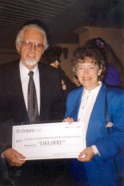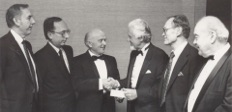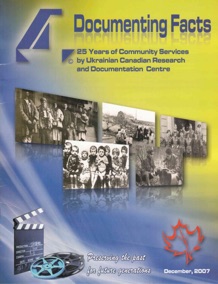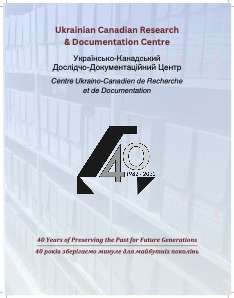










The UCRDC was established in 1982, initially under the name of Ukrainian Famine Research Committee. The Committee was formed by a group of Ukrainian Canadians in Toronto to commemorate the 50th anniversary of the Holodomor - the famine genocide perpetrated by the Soviet regime in 1932–1933 that claimed an estimated seven million Ukrainian lives.
The Committee collected personal accounts from survivors and eyewitnesses of the famine living in Canada, the USA and Western Europe. (It was not possible, at that time, to collect any documentation in the then existing USSR since the Soviet authorities denied the genocidal famine.
Using the collected material, the Ukrainian Famine Research Committee produced a documentary film “Harvest of Despair”, which premiered in Toronto in 1984. It was shown at various film festivals and on major TV channels in Canada, the USA, the UK, Australia and other Western countries. Versions of the film were also produced in French, Spanish and Ukrainian languages. The film enjoyed considerable success.
In the process of making the film the Committee collected many hours of filmed documentation about the Holodomor, only a fraction of which was actually used in the film “Harvest of Despair”. Thus, in 1986 the Committee restructured into a research institute and changed its name to the Ukrainian Canadian Research and Documentation Centre.
Its scope, while continuing to encompass work on the Holodomor, was broadened to include research on other historical events relating to Ukrainians in Canada, Ukraine and other parts of the Ukrainian diaspora.
UCRDC also developed an Archive of oral history and other documentation, which could be used by educators, scholar and researchers.
The work undertaken by UCRDC has received recognition and accolades from individuals, academic organizations and government institutions in Canada, Argentina, Australia, Brazil, Ukraine, the United States, and other countries.

The UCRDC is funded through the sale of its films and publications, community organizational sponsorship and donations as well as individual donations and memorial gifts. An fundraising campaign is organized annually but it has brought in diminishing funds.
The UCRDC receives funding for specific research projects, from such academic institutions as the Canadian Institute for Ukrainian Studies, which provide scholarships for research work at the Centre, particularly for scholars from Ukraine.
Some government assistance is received: from the Department of Human Resources through its Student Summer Employment which allows the hiring of one or two students for the summer months. Occasionally, the Centre is awarded a grant for a specific project: e.g. the Ontario Ministry of Citizenship and Immigration for the Canadian Internment related exhibit and film.

Mr. Yaroslav Sokolyk, Ukrainian Canadian Congress (Toronto branch) president presents the UCRDC with $10,000
Ms. Elaine Ziemba, Minister of Citizenship and Immigration presenting a cheque on behalf of the Government of Ontario, with prof. Wasyl Janishewskyj, president



Patriarch Liubachivsky meets with
the UCRDC Directors at the residence of
Bishop Borecky
The UCRDC depends on voluntary donations – both individual and institutional - for its financing.
It provides receipts for tax purposes.
-
‣Home





